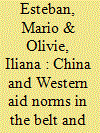| Srl | Item |
| 1 |
ID:
186172


|
|
|
|
|
| Summary/Abstract |
Despite considerable debate on the normative foundations of Chinese international development cooperation and how they compare with those of traditional donors,positivist studies on the normative consequences of China’s socialization into mainstream international norms of development assistance are scarce. This article explores this topic for the case of Ethiopia, an aid ‘darling’ with an extended presence of Chinese and Western development actors, taking the Aid Effectiveness Agenda as reference. Resorting to official documents, data analysis, and semi-structured interviews, the authors find that Chinese development actors’ understanding of ownership and transparency is relatively stable and different from that of Western donors and that they promote their own understanding of those principles among Ethiopian stakeholders. There are, however, significant changes in inclusive partnerships and the focus on results, that have more to do with a pragmatic adaptation process by Chinese actors than with a socialization process through their interaction with traditional donors.
|
|
|
|
|
|
|
|
|
|
|
|
|
|
|
|
| 2 |
ID:
095349


|
|
|
|
|
| Publication |
2009.
|
| Summary/Abstract |
In the last five years China has dramatically increased its presence in Africa. Despite its abundant natural resources, the notoriety of its political regime and its close relationship with Beijing, Equatorial Guinea is a glaring omission in the China-Africa literature. This article intends to fulfil that gap by analysing the bilateral relationship between Beijing and Malabo at both the official and the social levels to assess its impact on the development of Equatorial Guinea. As bad governance is the main obstacle for the development of Equatorial Guinea, the article compares the role played by Chinese companies and government in reinforcing Obiang's authoritarian regime with that played by their Western counterparts. It concludes that Chinese extractive firms play a marginal role in the financial extraversion that strongly links the Obiang regimen with US oil companies. Conversely, the Chinese government offers Obiang more extensive and stable support than Western governments to the extent that most of the undeniable developmental potential of Chinese co-operation is wasted through clientelist networks.
|
|
|
|
|
|
|
|
|
|
|
|
|
|
|
|